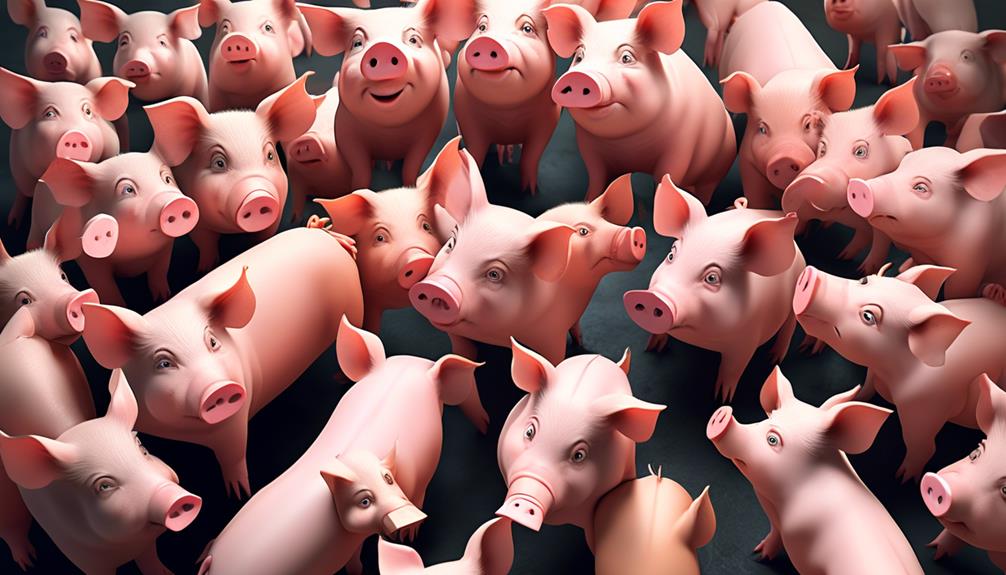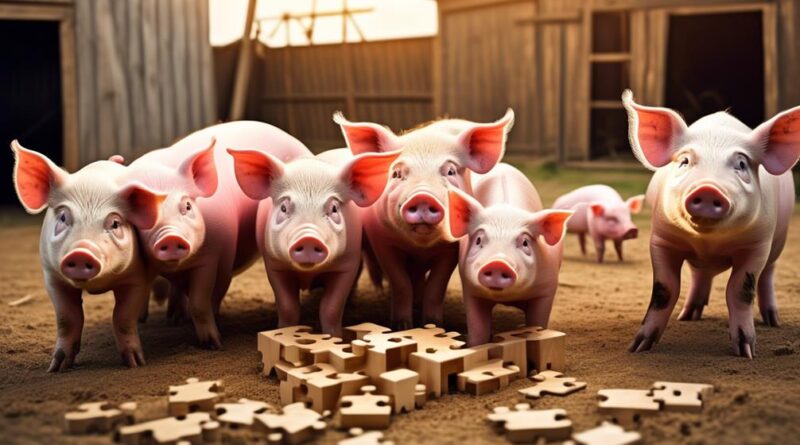Unveiling Pigs' Problem-Solving Abilities: A Deep Dive
You might think of pigs as just simple farm animals, but recent research has started to uncover the astonishing problem-solving abilities of these intelligent creatures.
As you consider the complexities of animal cognition, it's fascinating to explore the cognitive abilities of pigs and how they tackle various problem-solving tasks.
From observing pigs in complex situations to understanding their cognitive flexibility and social learning, the insights gained from studying pig behavior have far-reaching implications.
So, if you've ever wondered about the inner workings of these often underestimated animals, this deep dive into pigs' problem-solving abilities will surely offer some intriguing revelations.
The Cognitive Abilities of Pigs
Pigs demonstrate impressive problem-solving abilities, showcasing their cognitive prowess and adaptability in various environments. Pig cognition has become a focal point in behavioral studies and animal intelligence research, with numerous experiments highlighting their remarkable capabilities in problem-solving tasks.
In numerous studies, pigs have consistently displayed advanced cognitive abilities. For instance, when presented with a problem-solving task, pigs have shown remarkable skills in understanding and manipulating their environment to achieve a desired outcome. These tasks often involve challenges such as navigating mazes, using tools to obtain food rewards, or even operating simple mechanisms. Through these experiments, researchers have been able to observe the complex problem-solving abilities of pigs, shedding light on the depth of their cognitive capacities.
Moreover, the findings from these studies have implications beyond just understanding pig cognition. They provide valuable insights into animal intelligence as a whole, challenging traditional notions about the cognitive capabilities of farm animals. By demonstrating the sophisticated problem-solving skills of pigs, these studies have paved the way for a greater appreciation of the intelligence and adaptability of these animals.
Pig Intelligence in Problem-Solving Tasks
In observing pigs' problem-solving abilities, researchers have consistently noted their impressive cognitive skills and adaptability in various tasks. Pigs have demonstrated remarkable puzzle-solving skills, often surprising researchers with their problem-solving strategies. When faced with complex tasks, pigs have shown the ability to analyze the situation and devise effective solutions. Their problem-solving strategies involve a combination of persistence, exploration, and innovation.
Pigs have displayed an innate understanding of cause and effect, enabling them to tackle problems with a systematic approach. They demonstrate an ability to assess different options and select the most suitable course of action. In experiments where they're presented with challenging puzzles, pigs have exhibited a high degree of cognitive flexibility, readily adjusting their problem-solving strategies when initial attempts prove unsuccessful.
Researchers have also observed that pigs possess the capacity for insightful problem solving. In some scenarios, pigs have been seen to contemplate a problem before taking action, suggesting a level of cognitive deliberation. This deliberate approach to solving problems indicates a higher level of intelligence and cognitive processing.
Furthermore, pigs have shown the ability to learn from past problem-solving experiences, applying successful strategies to similar tasks in the future. This ability to transfer knowledge and skills to new situations highlights the depth of their problem-solving abilities.
Observing Pigs in Complex Situations
While examining pigs' problem-solving abilities, researchers have encountered complex situations that further showcase the animals' cognitive skills and adaptability. Observing pigs in complex scenarios has unveiled remarkable aspects of their behavior and problem-solving skills.
- Adaptation to Novel Environments: Pigs have demonstrated an impressive ability to adapt to new and challenging environments. When placed in unfamiliar settings, they exhibit curiosity and exploration, quickly familiarizing themselves with the surroundings.
- Tool Use and Manipulation: Studies have documented instances where pigs have effectively used tools to solve problems. They exhibit dexterity and creativity in manipulating objects to access food, navigate obstacles, or create comfortable resting spaces.
- Social Learning and Cooperation: Observations have revealed that pigs engage in social learning, where they observe and learn from the actions of their pen-mates. Moreover, they display cooperative behaviors when faced with complex tasks, collaborating to achieve common goals.
- Cognitive Flexibility and Innovation: Pigs have showcased cognitive flexibility by employing various strategies to solve problems. They adapt their approaches based on the specific challenges presented, demonstrating innovative thinking and the ability to overcome obstacles.
These observations highlight the intricate nature of pig behavior and their sophisticated problem-solving skills. Understanding how pigs navigate complex situations not only sheds light on their cognitive abilities but also provides valuable insights for animal welfare and cognitive research.
Insight Into Pig Problem-Solving
To gain insight into the problem-solving abilities of pigs, researchers have conducted experiments to assess their cognitive processes in various challenging situations. These experiments delve into the cognitive development of pigs and shed light on their problem-solving capabilities. Pigs have exhibited remarkable intelligence and adaptability in navigating complex tasks, showcasing a level of cognitive sophistication that's increasingly being recognized by the scientific community.
In studies focused on pig problem-solving, researchers have devised tasks that require the animals to exhibit a deep understanding of their environment and the ability to overcome obstacles. For instance, pigs have been observed using tools to access out-of-reach food, demonstrating a capacity for insightful problem-solving. This kind of behavior indicates a higher level of cognitive development and problem-solving skills than previously acknowledged.
Moreover, researchers have explored how pigs perceive and interact with novel objects and situations. This exploration has provided valuable insights into their cognitive processes, revealing their capacity for learning and applying acquired knowledge to solve problems. By observing how pigs approach and tackle new challenges, researchers have gained a deeper understanding of their problem-solving strategies and the underlying cognitive mechanisms at play.
Cognitive Flexibility in Pigs

Pigs' remarkable problem-solving abilities, as previously demonstrated, now lead to an exploration of their cognitive flexibility. Cognitive adaptability in pigs refers to their ability to adjust their behavioral responses based on the demands of different situations. This cognitive flexibility allows pigs to employ various problem-solving strategies to overcome environmental challenges.
Cognitive Adaptability:
Pigs have showcased impressive cognitive adaptability, being able to switch between different problem-solving strategies based on the specific environmental challenges they encounter. This adaptability is a testament to their intelligence and ability to navigate complex scenarios.
Behavioral Responses:
Their cognitive flexibility is also evident in their diverse behavioral responses to new or changing situations. Pigs have shown the capacity to modify their behavior in response to novel problems, indicating a high level of cognitive flexibility.
Problem Solving Strategies:
Pigs have been observed utilizing a range of problem-solving strategies to overcome environmental challenges. Whether it involves foraging for food in a new setting or navigating obstacles in their environment, pigs demonstrate a remarkable ability to adapt their problem-solving approaches to suit the task at hand.
Environmental Challenges:
Their cognitive flexibility enables them to effectively tackle a wide array of environmental challenges. From navigating physical barriers to understanding complex feeding apparatus, pigs exhibit an impressive capacity to adapt and overcome diverse environmental obstacles.
Tool Use and Adaptability in Pigs
Impressive displays of adaptability and problem-solving in pigs extend to their utilization of tools in overcoming environmental challenges. Pigs are adept at using tools to access food, manipulate objects, and create environmental enrichment.
For example, in a study conducted at the Society for Experimental Biology, it was observed that pigs used a novel tool, a piece of wood, to manipulate a joystick and obtain a food reward. This demonstrated their ability to adapt and use tools in innovative ways to solve problems.
Tool use in pigs isn't limited to experimental settings. In farming environments, pigs have been observed using their snouts to move and manipulate objects to create environmental enrichment. They use sticks to root and dig in the soil, demonstrating their natural inclination to use objects as tools for exploration and problem-solving. This behavior aligns with their wild counterparts, who use tools to build nests and forage for food.
Understanding the tool use and adaptability in pigs is crucial for improving their welfare in farming and research settings. By providing them with opportunities for environmental enrichment and tool use, we can support their natural behaviors and cognitive abilities.
Furthermore, studying their tool use can provide valuable insights into their cognitive and problem-solving skills, paving the way for advancements in animal welfare and enrichment strategies.
Social Learning in Pig Communities

In their natural communities, pigs exhibit remarkable social learning behaviors that build upon their problem-solving and adaptability skills, contributing to the rich tapestry of their cognitive abilities.
Social learning in pig communities is a fascinating aspect of their behavior, shedding light on their ability to acquire knowledge from one another and adapt to their environment. Here's a closer look at how social learning influences pig community behavior:
- Observational Learning: Pigs are adept at learning from observing the actions of others in their community. They can pick up new behaviors and problem-solving techniques by watching and imitating their fellow pigs.
- Communication and Cooperation: Social learning in pig communities often involves effective communication and cooperation. Pigs use vocalizations, body language, and other forms of communication to convey information and collaborate on tasks.
- Cultural Transmission: Pigs have been observed passing down learned behaviors from one generation to the next, showcasing the cultural transmission of knowledge within their communities.
- Adaptation to Challenges: Through social learning, pigs can collectively adapt to new challenges or changes in their environment. They can quickly spread and adopt innovative solutions to problems, leveraging the power of their community's collective intelligence.
Understanding the intricacies of social learning in pig communities provides valuable insights into their cognitive abilities and their capacity to thrive in diverse environments. This aspect of their behavior underscores the importance of social interactions and shared knowledge in shaping their problem-solving skills and adaptability.
Implications for Animal Welfare
Understanding the implications for animal welfare in light of pigs' problem-solving abilities and social learning behaviors is crucial for creating environments that support their cognitive development and overall well-being. Pigs' problem-solving abilities and social learning behavior suggest a level of emotional intelligence in pigs that must be considered in their care and treatment. It's important to recognize that pigs aren't only intelligent but also capable of experiencing emotions, including joy, fear, and stress. Ethical considerations in animal welfare demand that we acknowledge and respect these emotional capacities in pigs.
The implications of pigs' problem-solving abilities for animal welfare are profound. Recognizing emotional intelligence in pigs challenges us to provide environments that cater to their mental and emotional needs. This means creating living spaces that offer mental stimulation, opportunities for social interaction, and outlets for natural behaviors such as rooting and foraging. It also calls for reevaluating practices within the pork industry to ensure that pigs are provided with living conditions that support their emotional well-being.
Moreover, understanding the emotional intelligence of pigs has implications for how we view and treat these animals. It calls for a shift in perspective, recognizing pigs as sentient beings with complex cognitive and emotional lives. This shift has the potential to influence public attitudes towards pig welfare and drive changes in legislation and industry standards aimed at improving the lives of pigs.
Ultimately, acknowledging the emotional intelligence of pigs is a critical step towards promoting their welfare and ensuring their humane treatment.
Frequently Asked Questions
Are Pigs Able to Solve Problems in a Group Setting, or Are Their Abilities Limited to Individual Problem-Solving Tasks?
Pigs' social dynamics play a role in their group problem-solving. They can collaborate and learn from each other, enhancing their abilities beyond individual tasks. Natural problem solving is evident in their foraging behavior, while trained pigs can also adapt to complex tasks.
Tool usage showcases their cognitive abilities. Overall, pigs can solve problems in a group setting, demonstrating their intelligence and adaptability in various problem-solving scenarios.
What Are Some Real-World Applications of Understanding Pig Problem-Solving Abilities, Beyond Animal Welfare Considerations?
Understanding pig problem-solving abilities can lead to agricultural innovation by optimizing group housing and enrichment strategies. This can improve animal welfare and productivity, impacting the food industry.
Cognitive research in this area can also offer insights into animal behavior, informing economic decisions. By grasping pigs' problem-solving skills, we can enhance farming practices and potentially improve efficiency and sustainability within the agriculture sector, benefiting both animals and the economy.
How Do Pigs' Problem-Solving Abilities Compare to Those of Other Farm Animals, Such as Cows or Chickens?
When comparing pigs' problem-solving abilities to those of other farm animals like cows or chickens, it's clear that pigs exhibit impressive cognitive development.
Their comparative analysis with other farm animals highlights their advanced problem-solving skills.
Pigs demonstrate a remarkable ability to understand and navigate complex tasks, setting them apart in their cognitive capabilities.
Understanding these differences can provide valuable insights into animal behavior and intelligence across different species.
Can Pigs Be Trained to Use Tools in Problem-Solving Tasks, and How Does This Compare to Their Natural Adaptability in Using Objects?
You can train pigs to use tools in problem-solving tasks. It's fascinating to compare this with their natural adaptability in using objects.
Their ability for tool use and problem-solving has real-world applications, especially in enhancing animal welfare.
Studying pig breeds and population consistency in group problem-solving scenarios can provide valuable insights for cross-species comparisons.
Understanding the nuances between tool training and natural adaptability in pigs can lead to significant advancements in animal cognition research.
Are There Any Specific Breeds of Pigs That Have Been Found to Excel in Problem-Solving Tasks, or Do These Abilities Seem to Be Consistent Across Different Pig Populations?
Pig breeds vary in problem-solving skills, with some showing higher cognitive abilities and natural adaptability. Certain breeds exhibit stronger group problem-solving and tool usage.
However, overall, pigs demonstrate a remarkable capacity for problem-solving across different populations. Their natural adaptability to using objects suggests that problem-solving skills may be inherent, rather than breed-specific.
Conclusion
So, next time you see a pig, remember that they aren't just cute farm animals, but intelligent problem solvers. Their cognitive abilities, adaptability, and social learning skills are truly impressive.
Understanding their capabilities can have significant implications for animal welfare and how we interact with pigs in various settings. Keep an open mind and appreciate the intelligence of these fascinating creatures.
